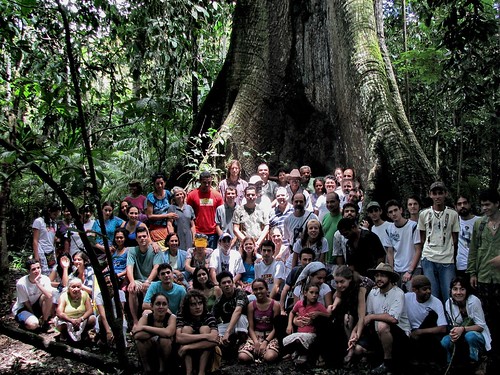
Gathering around a great Samauma Branca in Acre, Brazil. January 5, 2008
As ‘Sinks’ for Carbon, Forests Are Even Mightier Than Assumed
Re-posted from the NY Times
By JOANNA M. FOSTER
The world’s forests are magnificent palaces of biodiversity, teeming with wacky and wonderful creatures and plants that seem otherworldly. But they’re also something far more mundane although useful: they’re giant sponges, soaking up vast amounts of carbon dioxide.
According to a study published online on Thursday by the journal Science, the world’s forests absorb 2.4 billion tons of carbon dioxide each year, or about one-third of the carbon dioxide released through the burning of fossil fuels.
The lead author, Yude Pam, a research forester at the Forest Service, describes the study as the most comprehensive analysis of the global carbon budget to date. It shows that forests are a far more significant carbon sink than previously thought. At the same time, the report emphasizes the devastating effects of tropical deforestation and the need to protect trees that perform an enormous global service.
Of the three different types of forests studied — boreal, temperate and tropical — the paper shows that tropical forests are the most dynamic in capturing carbon dioxide. During the 17-year study period, from 1990 to 2007, an international team of researchers found that established tropical forests alone captured about 1.2 billion tons of carbon dioxide a year, accounting for 55 percent of the total established carbon sink in forests.
At the same time, however, deforestation in the developing world, most notably in Indonesia and Brazil, is releasing about three billion tons of carbon into the atmosphere each year, the researchers write. While this is offset somewhat by forest regrowth, which annually absorbs about 1.6 billion tons of carbon, over all, shifts in tropical land use, like clearing land for agriculture, is still emitting 1.3 billion tons annually.
In an interview, Richard Birdsey, program manager at the Forest Service and another lead author of the paper, emphasized that what happens in the tropical forests “can make or break the carbon budget.”
“But these forests are some of the least well monitored,” he said. The researchers’ greatest uncertainty about their data concerned tropical forests, Dr. Birdsey said, although “these are the numbers that are most crucial to get right and get acting on.”
He said that programs like REDD (Reducing Emissions from Deforestation and Forest Degradation), a United Nations effort to make forest protection in the developing world a priority in combating climate change, needs to move from discussion and pilot studies to serious and widespread action.
If the deforestation numbers could be subtracted from the global carbon equation, established forests and forest regrowth could potentially capture half the carbon dioxide emitted from burning fossil fuels.
The extent of deforestation, however, is only expected to get worse as humans continue to fell trees. And then there is the entire range of human activity that contributes to climate change, resulting in drought, fires and the spread of insects like the notorious bark beetle, which is wreaking havoc on forests in North America.






No comments:
Post a Comment